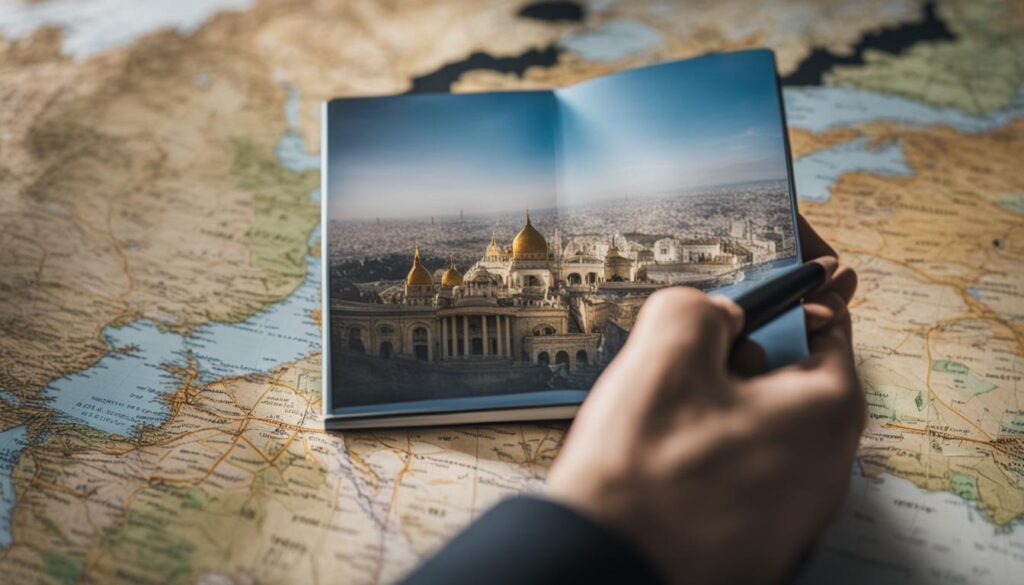Are you planning a trip overseas but fear speaking in a foreign language? Overcoming speaking anxiety while traveling is possible with practical tips and strategies that we’ll explore in this article.
Whether you struggle with language barriers or feel intimidated by unfamiliar environments, we’ve got you covered. With these techniques, you’ll boost your language confidence and communicate fluently and confidently during your travels, without succumbing to anxiety and fear.
So, whether you’re a frequent traveler or are about to embark on your first foray abroad, read on to discover useful strategies to conquer speaking anxiety and unlock your language potential.
Understanding the Impact of Speaking Anxiety
Conquering foreign language anxiety and managing language barriers while on the move can be a significant challenge, but it is essential to understand the impact of speaking anxiety while traveling. The unfamiliar surroundings and language barriers can amplify our fears and make communication more challenging. When we try to communicate in a foreign language, we may become self-conscious and uncertain, leading to anxiety and stress. However, by recognizing these factors and addressing our anxieties head-on, we can unlock the keys to confident communication abroad.
It is worth noting that the consequences of speaking anxiety go beyond communication challenges. It can also impact our overall travel experience, including enjoyment and cultural immersion. Speaking confidently in unfamiliar environments allows us to explore and connect with locals, which is fundamental to the travel experience.
Fortunately, there are techniques to overcome language barriers and speaking anxiety. In Section 3: Preparing Ahead for Better Communication, we will discuss practical tips for speaking fluently while traveling, including boosting your language confidence. But before we dive into strategies, let’s explore the impact of speaking anxiety further.
The Impact of Language Barriers
Language barriers can make communication difficult and sometimes impossible, leading to feelings of frustration, isolation, and cultural disconnection. Whether you’re ordering food, asking for directions, or simply trying to connect with locals, speaking the language can enhance the experience and help build meaningful relationships.
To highlight the impact of language barriers, here are a few examples:
| Consequence of Language Barriers | Examples |
|---|---|
| Lost Opportunities | Missed out on a local cultural event because you couldn’t understand the advertisement. |
| Frustration and Isolation | Feeling frustrated or alone because you can’t communicate with locals. |
| Misunderstandings | Misunderstandings that lead to confusion or offense. |
The impact of language barriers is clear. But by taking steps to overcome speaking anxiety and prepare in advance, you can improve your language abilities and build confidence in communicating with locals.
Preparing Ahead for Better Communication
When traveling to a new country, preparing ahead is crucial for effective communication. Whether you’re a beginner or advanced language learner, there are steps you can take to boost your language confidence and set yourself up for success in unfamiliar environments.
Learn Basic Phrases
Learning basic phrases can go a long way in facilitating communication while traveling. Take some time to research and memorize common phrases such as greetings, directions, and ordering food. Your effort will be appreciated by the locals and can help you navigate through simple tasks with ease.
Practice Pronunciation
Practicing pronunciation is a key component of effective language learning. You can utilize apps, online resources, or even language exchange partners to practice your pronunciation skills. The more you practice, the more comfortable and confident you’ll become.
Research Local Accent and Slang
It’s essential to research the local accents and slang specific to the region you’re traveling to. This can help you avoid misunderstandings and communicate more effectively. Additionally, you may even impress the locals with your understanding of their unique language variations.
Use Technology to Your Advantage
Technology can be a valuable resource for language learners. Utilize translation apps, language learning websites, and even social media to connect with native speakers and practice your language skills.
By preparing ahead and utilizing available resources, you can set yourself up for success in communicating fluently while traveling. With a little effort and practice, you’ll find yourself navigating unfamiliar environments with ease and confidence.
Embracing Cultural Differences for Effective Communication
To speak confidently in unfamiliar environments, you must do more than just learn the language. Cultural awareness and sensitivity are essential for navigating diverse settings. Understanding and embracing cultural differences can help improve your overall communication experience when traveling abroad.
One effective strategy is to familiarize yourself with local customs and etiquette. For example, in Japan, it’s customary to bow instead of shake hands when greeting someone. In France, it’s important to address people by their formal titles, such as “Monsieur” or “Madame.
Did you know? In some cultures, it’s considered rude to make direct eye contact when speaking. In Japan, it’s polite to avert your gaze as a sign of respect.
When interacting with locals, pay attention to their body language and tone of voice. Nonverbal communication can convey a lot of meaning and may differ from what you are used to. Additionally, showing interest in people’s cultures and asking questions can demonstrate respect and foster connections.
Example:
“In the U.S., it’s considered appropriate to make eye contact when speaking to someone. However, in my recent trip to Japan, I learned that direct eye contact can be seen as confrontational. I made an effort to avert my gaze while speaking to locals, which helped me connect better with them.”
Incorporating cultural experiences into your travels can also enhance your communication abilities. Visiting local museums, attending cultural events, and learning about history can deepen your understanding of the people and their language.
Remember, effective communication involves more than just words. Cultural sensitivity and awareness are vital for speaking confidently in diverse settings.
Breaking the Ice: Building Confidence in Conversation
When traveling to a foreign country, the thought of conversing with strangers in a foreign language can create feelings of anxiety. However, initiating conversation is a crucial step in overcoming speaking anxiety. Here are some practical strategies for overcoming speaking anxiety while on the go:
- Start with Small Talk: Even a simple greeting or asking for directions in the local language can have a positive effect on your confidence level.
- Find Common Interests: Use your surroundings to find common interests to discuss. A shared interest can often break the ice and lead to an engaging conversation.
- Prepare Open-Ended Questions: Open-ended questions can lead to more in-depth conversations, providing opportunities to practice your language skills.
- Don’t be Afraid to Make Mistakes: Language learning is a process, and making mistakes is a part of that process. Embrace your mistakes and learn from them.
Building confidence in conversation is crucial in overcoming speaking anxiety. By using these practical strategies, you can start conversations and maintain engaging dialogues while traveling abroad.
Practicing Active Listening for Improved Communication
Communicating in a foreign language can be daunting, but practicing active listening is a valuable technique for overcoming the fear of speaking in a foreign language. By listening attentively and engaging in the conversation, you can improve your comprehension and demonstrate that you are interested in the person and what they are saying. To improve your active listening skills, try the following techniques:
- Give your full attention to the speaker
- Ask questions to clarify what you don’t understand
- Use nonverbal cues to show you are engaged
- Summarize what the speaker has said to ensure you have understood correctly
By incorporating these techniques, you’ll become a more attentive listener and confident speaker. Remember, language is about communication, and not just speaking.
“Active listening is key to effective communication. When you listen closely, you demonstrate that you value the conversation and the person speaking. This approach fosters meaningful connections and enriching cultural exchanges.”
Seeking Language Support and Resources
Traveling to foreign countries can be an exciting and enriching experience. However, it can also bring language barriers that may hinder your communication. To overcome such barriers and have an effective communication abroad, it’s essential to seek language support and access resources that can improve your communication experience.
The first step is to find language support, including language learning centers, tutors, or language exchange programs. Many universities and community centers offer language classes, and you can also take online courses or hire a private tutor. This way, you can learn the local language and improve your communication abilities while traveling.
Another valuable resource is translation apps, which can assist you in understanding what people are saying or provide you with translations in real-time. Some popular apps that can aid you in managing language barriers while on the go are Google Translate, iTranslate, and Waygo.
Connecting with local people can also be a great way to enhance your communication abroad. They can provide you with insights into the local culture and language while also practicing and improving your language skills. Be open to striking up conversations with locals, and you may find that it’s an excellent opportunity to improve your communication abilities.
By leveraging these resources- language support, translation apps, and connecting with locals, you can navigate language barriers with ease and enhance your overall communication experience. Remember, communication is key to making the most of your travels, so don’t let language barriers hold you back.
Stepping Outside Your Comfort Zone: Taking Language Risks
When it comes to conquering foreign language anxiety and speaking confidently while abroad, it’s important to take risks and step outside of your comfort zone. While it can be daunting to practice language skills in unfamiliar environments, doing so is essential for growth and progress.
To take language risks, start by seeking out native speakers and engaging in conversation. Don’t be afraid to make mistakes – embracing them as learning opportunities will help bolster your confidence over time. Additionally, developing a growth mindset, focusing on progress over perfection, can help you approach language learning with a positive attitude and overcome setbacks more easily.
“The limits of my language mean the limits of my world.”
Boosting Confidence through Cultural Immersion
Speaking confidently in unfamiliar environments can be a daunting task. However, immersing yourself in the local culture can significantly boost your confidence in speaking while abroad. The benefits of cultural immersion include:
- Language practice opportunities
- Building relationships with locals
- Gaining a deeper understanding of the language and its context
By embracing cultural immersion, you’ll emerge as a more confident communicator, ready to engage in conversations with locals and navigate diverse environments with ease.
Language Practice Opportunities
One of the most significant benefits of cultural immersion is the opportunity to practice the language in its natural context. Whether you’re conversing with a local shopkeeper or attending a street fair, these interactions offer valuable opportunities to practice your language skills and build your confidence in speaking. Remember, practice makes perfect, so embrace every opportunity to speak.
Building Relationships with Locals
Building relationships with locals is another crucial aspect of cultural immersion. By connecting with the local community, you’re not only learning more about the culture and language but also building a network of support. Locals are often eager to help foreigners, and establishing meaningful connections can ease the stress of unfamiliar environments and enhance your language learning experience.
Gaining a Deeper Understanding of the Language and its Context
Immersing yourself in the local culture also provides an opportunity to gain a deeper understanding of the language and its context. From idiomatic expressions to cultural norms, these nuances shape the way we communicate. By embracing cultural immersion, you’ll gain a more nuanced understanding of the language and its cultural context, ultimately enhancing your overall communication abilities.
Incorporating cultural immersion into your travel experience may seem intimidating at first, but the benefits are undeniable. By stepping outside your comfort zone, practicing the language in its natural context, building relationships with locals, and gaining a deeper understanding of the language and its context, you’ll emerge as a more confident communicator.
Overcoming Setbacks: Resilience in Language Learning
Learning a new language can be challenging, especially when managing language barriers while on the move. However, setbacks are a natural part of the language learning process. A positive mindset and resilience are essential to overcome challenges and continue making progress in your speaking abilities.
Here are some techniques to help you overcome setbacks:
- Shift your mindset: Instead of focusing on mistakes as failures, see them as opportunities for learning and growth. Accept that setbacks are a normal part of the process and use them as motivation to keep going.
- Break down your goals: Language learning can be overwhelming when approached in large chunks. Break down your goals into small, achievable tasks and celebrate each accomplishment along the way.
- Stay engaged: Language learning should be fun and engaging. Make use of resources like podcasts, music, and movies in your target language to keep it interesting and entertaining.
- Get support: Seek language support and resources when needed. Utilize tutoring services, language exchange programs, or language apps to help you practice and improve your speaking abilities.
- Celebrate progress: Recognize and celebrate your progress. Even small improvements are worth acknowledging and can help motivate you as you continue your language learning journey.
Remember, developing resilience takes time and practice. But with perseverance and a positive attitude, you can overcome setbacks and continue building your language skills.
Integrating Language Practice into Your Travel Itinerary
To overcome speaking anxiety while traveling, it’s important to practice speaking your target language regularly. One effective way to do this is by integrating language practice into your travel itinerary. By doing so, you can build your confidence over time and accelerate your progress. Here are some practical tips for incorporating language practice into your daily activities while on the go:
- Start small: Begin with simple interactions, such as ordering food or asking for directions. These low-pressure situations can help build your confidence and lead to more substantial conversations later on.
- Connect with locals: Strike up conversations with locals in coffee shops, markets, or parks. This is a great way to gain insight into the local culture while practicing your language skills.
- Use language exchange apps: Apps such as Tandem or HelloTalk can connect you with native speakers who are looking to practice your target language. This provides an opportunity to practice in a pressure-free, supportive environment.
- Attend language classes or group events: Many cities offer language classes or group events for travelers looking to improve their language skills. These can be a valuable resource for meeting other language learners and practicing in a structured setting.
Remember, integrating language practice into your travel itinerary doesn’t have to be time-consuming or complicated. By incorporating these simple strategies, you can make progress in your speaking abilities while enjoying all that travel has to offer.
Conclusion
In conclusion, you now have practical strategies for overcoming speaking anxiety and communicating fluently while traveling abroad. By preparing ahead, embracing cultural differences, practicing active listening, seeking language support, taking language risks, immersing yourself in the local culture, developing resilience, and integrating language practice into your travel itinerary, you can communicate confidently in unfamiliar environments.
Remember to take small steps and be patient with yourself as you progress in your language learning journey. Whether you’re ordering food or asking for directions, every opportunity to speak is a chance to improve your language skills and build confidence.
Don’t let speaking anxiety hold you back from experiencing the enriching experience of communicating with people from different cultures on your travels. By implementing these tips and techniques, you’ll unlock your language potential and enjoy a more fulfilling travel experience.

















































